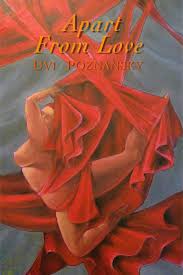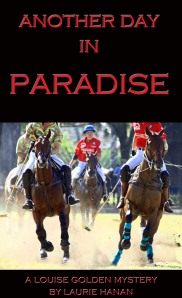It’s my pleasure to have as my guest today Uvi Poznansky . While she doesn’t write murder mysteries, according to Uvi her characters do harbor murderous thoughts. Here’s what she has to say about them:
Laurie: Your novel, Apart From Love, is a cross between Contemporary Romance and Family Saga. Tell me a little about it.
 Uvi: My novel, Apart From Love, is an intimate peek into the life of a uniquely strange family: Natasha, the accomplished pianist, has been stricken with early-onset Alzheimer’s. Her ex-husband Lenny has never told their son Ben, who left home ten years ago, about her situation. At the same time he, Lenny, has been carrying on a love affair with a young redhead, who bears a striking physical resemblance to his wife–but unlike her, Anita is uneducated, direct and unrefined. This is how things stand at this moment, the moment of Ben’s return to his childhood home, and to a contentious relationship with his father.
Uvi: My novel, Apart From Love, is an intimate peek into the life of a uniquely strange family: Natasha, the accomplished pianist, has been stricken with early-onset Alzheimer’s. Her ex-husband Lenny has never told their son Ben, who left home ten years ago, about her situation. At the same time he, Lenny, has been carrying on a love affair with a young redhead, who bears a striking physical resemblance to his wife–but unlike her, Anita is uneducated, direct and unrefined. This is how things stand at this moment, the moment of Ben’s return to his childhood home, and to a contentious relationship with his father.
Laurie: Tell us about the Anita, the girl in the midst of a firestorm of passion in this story.
Uvi: Anita is has been dabbed “a diamond in the rough” by one of my reviewers. She is so direct, sultry yet naive, and most of all, different… How, you may wonder out loud, did she spring from my mind?
The answer is a bit odd. At first I decided to model her as the-opposite-of-me. By which I mean a lot more than just her use of language (talking in sentences laden with ‘like’ and the dreaded double-negatives.) Anita was to become a bold and spontaneous spirit, anything but repressed. She would be promiscuous. Her voice would be shockingly direct:
“In my defense I have this to say: When men notice me, when the lusty glint appears in their eyes, which betrays how, in their heads, they’re stripping me naked—it’s me they accuse of being indecent.
Problem is, men notice me all the time.
How can a girl like me ever claim to be innocent? Even if I haven’t done nothing wrong, I’m already soiled, simply because of their dirty thoughts.”
And from the beginning she would move quickly to get what she wants:
“The minute our eyes met, I knew what to do: so I stopped in the middle of what I was doing, which was dusting off the glass shield over the ice cream buckets, and stacking up waffle cones here and sugar cones there. From the counter I grabbed a bunch of paper tissues, and bent all the way down, like, to pick something from the floor. Then with a swift, discrete shove, I stuffed the tissues into one side of my bra, then the other, ‘cause I truly believe in having them two scoops—if you know what I mean—roundly and firmly in place.
Having a small chest is no good: men seem to like girls with boobs that bulge out.”
I don’t even know how it happened, but once Anita started talking in my mind—which she did for nearly a year—I started to like her more and more. I asked myself, how would she play against Ben, who is a complex character, hesitant, highly sophisticated? How would she play against Lenny, a would-be author who is so proud of his refined expressions, when her background is so different from his? To my surprise, Anita ended up taking over not only the story, but also me.
Laurie: What kind of relationship starts forming between her and Ben?
Uvi: Facing a woman that brings memories of his mother to his mind, a woman who is married to his father yet is younger than him, Ben’s mind plays tricks on him. Here is how he describes his reaction to her:
“I open my eyes and at once, fear awakens in me. No, not just fear—but something more severe, something like a rage, a murderous rage. Right now it is a vague emotion, still without form.
“I do not even want to know at whom it is aimed—but I recognize that it is fueled, in part, by desire. It turns me white with anguish, as if I have just walked through glass, shattering it—or let my fingers spread open, dropping an egg to the floor, or a fossil, the fragile fossil of a fetus.
I move the knife away from me and—trying to avoid any rush moves—I turn to take a look at Anita: her outline is framed, for an instant, by the kitchen door. The next instant she is gone.”
Anita, for her part, can sense the murderous spark in his eyes:
“I pity him, seeing how consumed he is by desire. His entire body is like, burning up. And his eyes, they’re fluttering around me until—like a moth heading, in a roundabout way, into a light source—they connect with mine. I can sense his hate sometimes, and at once pull back from him, ‘cause I spot how hard his jaw is set, and even, how murderous the spark right there, in that shadow under his lashes, which reminds me of some animal, getting pretty tense, like, getting ready for the kill.”
Laurie: When you write a book, is the place where the story takes place important to you? Give me an example of the setting in Apart From Love.

Uvi: I find that you more likely to gravitate towards a story if the place is familiar to you–you have your own memories of it, perhaps–or if it sweeps you away to a distant place, a place you have never visited, or even envisioned before?
Here is an excerpt from Apart From Love, where the protagonist, Ben, talks about coming back to town, and seeing San Vicente Street with fresh eyes–seeing it as it is and as it was then.
” The reason I know this place, the reason it ignites such emotion, such passion in me, is not the sight of these homes—but the majestic trees, whispering in the night air. Planted at regular intervals along the median, as long as the eye can see, they are named Naked Coral Trees. Naked because—according to my father—they shed their leaves annually.
During our walks that spring, dad would point out the tree: Its fiery red flowers, that looked like fat pinecones at the tips of irregular, twisting branches, and the seeds, which in certain species were used for medicinal purposes by indigenous peoples. The seeds were toxic, he warned, and could cause fatal poisoning. I learned that mature Coral trees should be watered frequently—but not during the summer months. In fact, he said, the less water in summer, the more flowers you can expect the following spring.
I cross two lanes of traffic, come closer to one of those Naked Coral Trees, and with great awe, brush my fingers across the trunk. It is a contorted, elephantine thing, with a roughly textured bark, and thick roots clinging fiercely to the earth. This being early October there are no flowers, no leaves, even. The tree seems to take on a humanoid appearance, as if it were the body of a character, or even several characters, mangled beyond recognition.
It is a stunning sight, which has fascinated me since childhood. Above me, the bare limbs—some of which have been pruned recently—are branching apart, and looking at them you can imagine a knee here, an elbow there, someone wrestling, someone in embrace.
As you walk past them, the trees seem to tell you a story line by line, scene by scene. In one tree I could see a man and a woman, kissing; in another, a father and son.”
Find out more about this talented author and artist at these sites:
Blog: http://uviart.blogspot.com
Amazon http://www.amazon.com/Uvi-Poznansky/e/B006WW4ZFG/
pInterest: http://pinterest.com/uviart/
Facebook: http://www.facebook.com/uviart
Goodreads: http://www.goodreads.com/author/show/5758946.Uvi_Poznansky
Twitter: https://twitter.com/UviPoznansky
 If ever a book deserved more than five stars, it is this one. Each paragraph flows like a poem, and I found myself reading the same words again and again, trying to absorb all the ideas contained in each line. This is not a fast read, by any means, but well worth taking the time to read it well.
If ever a book deserved more than five stars, it is this one. Each paragraph flows like a poem, and I found myself reading the same words again and again, trying to absorb all the ideas contained in each line. This is not a fast read, by any means, but well worth taking the time to read it well.






















